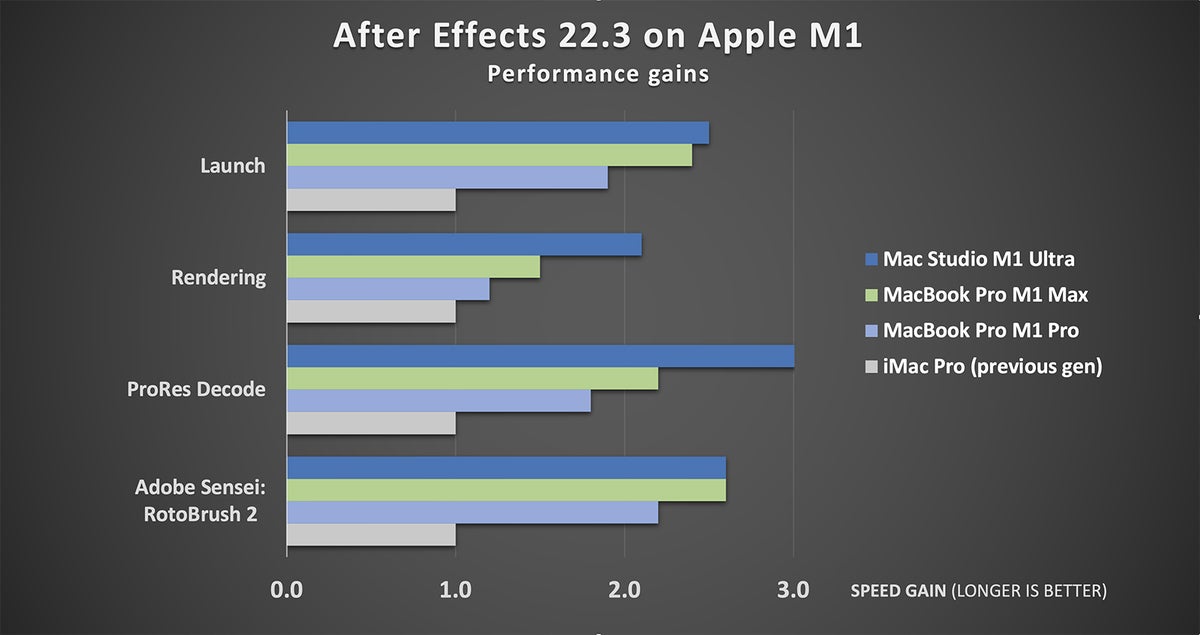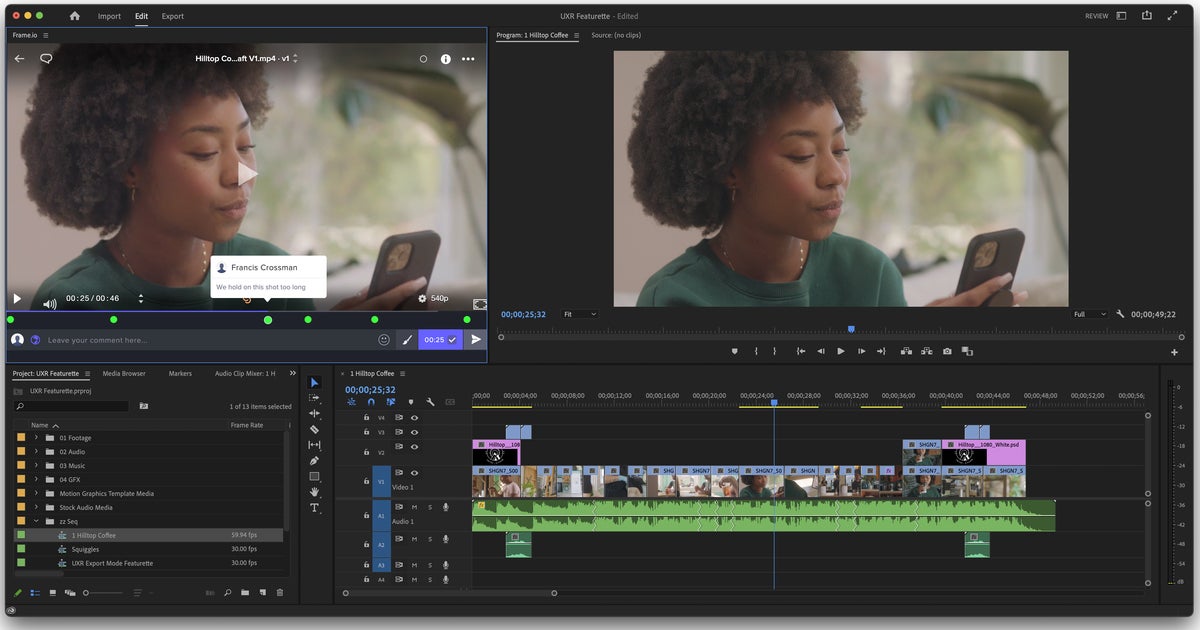































Professional application news now turns to video and broadcasting as the giant National Association of Broadcasters (NAB) show approaches - and Adobe has big news for After Effects and Apple Silicon.
Adobe has introduced a new edition of key motion graphics industry standard, After Effects, which is available to ship as of today. The company claims that in comparison with performance on Intel-based iMac Pros, the new release runs up to three times faster on M1 Ultra Macs, and twice as fast on an M1.
The company shared data to show that when it comes to some of the most commonly run tasks, including ProRes Decode, M1 Macs trounce the capability of the previous generation iMac Pro.
 Adobe
Adobe How After Effects performs on different Macs.
The results show a Mac Studio running an M1 Ultra processor is more than twice as fast - and in the case of ProRes - three times as fast, as the iMac Pro. A MacBook Pro running an M1 Pro chip is more than twice as fast as that Intel iMac Pro in some tasks. Adobe Sensei learning features such as Roto Brush 2 and Scene Edit Detection are faster and ProRes decoding is up to four times faster on M1 Ultra systems.
Speed and performance are critical in motion graphics workflows, and this release provides impressive quantities of both, the company said.
"Faster rendering enhances the creative process," Adobe said in a statement, pointing out that improvements in Multi-Frame Rendering gave the app a four-fold boost in speed last year. "Native support for Apple M1 systems only builds on these gains. With two significant speed boosts in just 6 months, After Effects has never gotten faster so fast."
Premiere Pro customers can now expect Frame.io for Creative Cloud as part of their membership. Frame.io is a cloud-based collaboration resource designed to support collaboration from within the application (Premiere Pro or After Effects).
Frame.io for Creative Cloud lets an unlimited number of people review and approve work and provides accelerated file transfers and capacity for up to 100GB of data. Adobe calls this, "the fastest, easiest, and most secure way to get footage from cameras to collaborators - anywhere in the world."
 Adobe
Adobe Premiere Pro customers now get access to Frame.io.
Additional improvements include new navigation tools and a highly visual mode Adobe calls "Import Mode." That means a media-first approach in which a blank project window is replaced with media assets that can be gathered for use in the work. Once assets are selected, tap the Create Premiere Pro project button to begin.
Editors can, of course, also work from the Project panel if they prefer; this sees several useful enhancements, including the capacity to review clips and save favorite locations (folders, external storage, etc) from which clips are gathered. Navigation and social media export tools are built in, and users gain access to new free Adobe Stock assets, including HD and 4K footage, motion graphics templates and more.
Adobe has been delivering consistent performance and speed improvements ever since it began migrating its creative apps to Apple Silicon. While there's plenty of competition, Adobe's creative apps are just as important to creative markets as Microsoft's have become to productivity, so the improvements it is realizing have a significant impact on what people do for a living.
Shortly after Apple Silicon support in Photoshop was introduced, I spoke with Adobe's principal product manager at Photoshop, Mark Dahm, who explained some of the benefits. "For developers familiar with developing for the Mac platform, developing for the M1 should be a smooth experience. Apple's significant investment in the developer toolchain and experience was a major factor here.
"We were happy to see some key benefits like Metal's unified memory system paying dividends across device surfaces."
In the last year, Adobe has continued to bring its creative applications to Apple Silicon, realizing the benefits as it has done so. Bryan O'Neil Hughes told me: "We've seen extremely impressive results across our native applications, from launch through workflow. These gains are even more profound in workflows [that] rely heavily upon the deep integration with Apple Silicon (imaging and video are great examples of large files which push these new machines to their limits)."
These improvements in computational performance also mean Apple's Macs are gaining market share even as competitors (with the exception of Dell) see PC market share decline, as reported by IDC.
What's interesting, of course, about those figures, is if the analysis included iPads (as it should, given they run the same processor as Macs), then Apple's share would be accelerating even higher. It will be interesting to see just how much of this market Apple can convince to sign up to its heavily speculated "Apple as a service" plan.
Please follow me on Twitter, or join me in the AppleHolic's bar & grill and Apple Discussions groups on MeWe.
 Tags quentes :
Maçã
MacOS
Computadores e Periféricos
Tags quentes :
Maçã
MacOS
Computadores e Periféricos